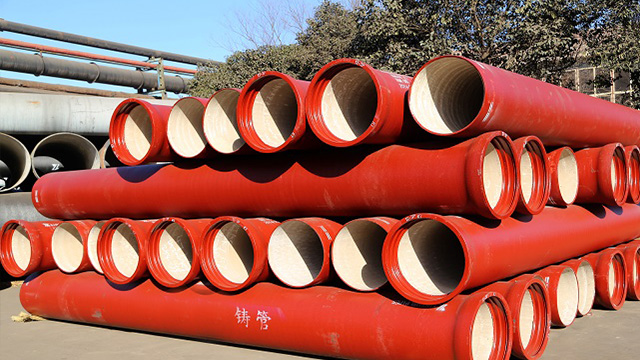Application of Cast Iron Pipe - Urban Drainage System
2025-01-15 15:32:26 hits:0

With the acceleration of urbanization, the continuous expansion of urban scale, and the increasing population density, urban drainage systems are facing unprecedented challenges. On one hand, urban construction has led to a significant increase in impermeable ground area. The surface runoff formed by rainfall is rapid and concentrated, putting forward higher requirements for the drainage capacity of the drainage system. On the other hand, the quantity and composition of urban sewage are becoming increasingly complex. It not only contains a large amount of organic matter and chemical substances but may even contain corrosive substances. This poses a huge test to the corrosion resistance and durability of cast iron sewer pipes and other drainage pipelines. In addition, the drainage system also needs to withstand external loads from ground traffic and building weights, as well as cope with the impacts of geological disasters such as earthquakes and ground subsidence.
Advantages of Cast Iron Pipes in Urban Drainage Systems
1. High Strength and Toughness
Cast iron pipes, especially ductile cast iron pipes, possess extremely high strength and toughness. Their tensile strength can reach 400 - 800MPa, enabling them to withstand significant pressure without cracking. In urban drainage systems, whether buried deep underground to bear the enormous pressure of the soil or facing unexpected loads such as ground construction and vehicle rolling,cast iron pipes can maintain their structural integrity by virtue of their high strength. Meanwhile, their good toughness makes them less likely to break when encountering geological disasters like earthquakes and ground subsidence, ensuring the normal operation of the drainage system to the greatest extent.
2. Excellent Corrosion Resistance
Urban sewage contains various acidic and alkaline substances, microorganisms, etc., which have an obvious corrosive effect on drainage pipelines. Cast iron pipes, after special anti - corrosion treatments such as spraying anti - corrosion coatings on both the inner and outer walls, can effectively resist the erosion of sewage. For example, the outer wall of ductile cast iron pipes is usually sprayed with a zinc layer, combined with asphalt paint protection, forming a double - layer anti - corrosion barrier, which greatly extends the service life of the pipes. In some old urban areas, cast iron sewer pipes that have been in use for decades can still function normally despite years of exposure and sewage corrosion, fully demonstrating their excellent corrosion resistance. However, issues like cast iron sewer pipe corrosion still need continuous attention, and proper maintenance and treatment measures should be taken.
3. Good Sealing Performance
The sealing performance of the drainage system is of utmost importance. Once there is leakage, it will not only lead to sewage overflow and environmental pollution but may also cause problems such as rising groundwater levels and soil structure damage. Cast iron pipes adopt advanced connection technologies, such as flexible joint connections, which can ensure a tight connection between pipes and effectively prevent sewage leakage. This flexible joint can also adapt to a certain degree of pipeline displacement and deformation, further improving the stability and reliability of the drainage system.
4. Superior Hydraulic Performance
The inner wall of cast iron pipes is relatively smooth, with low water flow resistance, which can effectively improve drainage efficiency. Under the same pipe diameter and slope conditions, the drainage flow rate of cast iron pipes is greater than that of some other materials' pipes. This advantage enables cast iron pipes to quickly drain a large amount of accumulated water during extreme weather such as heavy rain, reducing the risk of urban waterlogging.
Specific Applications of Cast Iron Pipes in Urban Drainage Systems
1. Main Trunk Drainage
Large - diameter cast iron pipes are widely used in the main drainage trunks of cities. These pipes, usually with a diameter of DN200 and above, are responsible for collecting sewage and rainwater from various areas of the city and transporting them to sewage treatment plants or water bodies around the city. For example, in the central area of a large - scale city, a DN800 ductile cast iron drain pipe with a length of several kilometers has been laid. It has been operating stably for years, effectively ensuring the smooth drainage of this area.
2. Branch Line Drainage
Medium - diameter cast iron pipes play an important role in the secondary and branch roads of the city, as well as in the drainage systems around buildings. They collect the sewage generated by each building and the rainwater from nearby areas and transport them to the main trunk drainage pipes. These medium - diameter cast iron pipes generally have a diameter between DN100 - DN200 and are characterized by easy installation and strong adaptability. Cast iron plumbing pipe and fittings of appropriate specifications are used in these branch line drainage systems to ensure smooth connection and normal operation.
3. Drainage in Special Environments
In some special environments, such as coastal areas and chemical industrial parks, the requirements for drainage pipelines are even more stringent. The soil and groundwater in coastal areas contain a large amount of salt and are highly corrosive; the sewage in chemical industrial parks may contain various strongly corrosive chemical substances. In these areas, cast iron pipes with special anti - corrosion treatments are the first choice. They can operate stably in harsh environments and ensure the normal operation of the drainage system. If problems occur in these pipes, methods such as using a cast iron sewer pipe repair sleeve may be considered for repair.
Development Trends of Cast Iron Pipes in Urban Drainage Systems
With the continuous progress of science and technology, the application of cast iron pipes in urban drainage systems is also constantly evolving and innovating. On one hand, new anti - corrosion materials and processes are emerging continuously, further improving the corrosion resistance and service life of cast iron pipes. For example, some anti - corrosion coatings using nanotechnology are being developed and applied, which are expected to bring a qualitative leap to the anti - corrosion performance of cast iron pipes. On the other hand, intelligent drainage systems are gradually emerging. As an important part of the drainage system, cast iron pipes will also be combined with sensors, intelligent control systems, etc., to achieve real - time monitoring and intelligent management of the drainage system. This can timely detect and solve problems such as pipe blockages and leaks, improving the operating efficiency and management level of the urban drainage system.
In this huge and complex urban drainage system, cast iron pipes, with their excellent performance, have become the sturdy guardians ensuring smooth urban drainage and a healthy environment. With the development of cities and the progress of technology, it is believed that cast iron pipes will continue to play an important role in urban drainage systems and continuously adapt to new demands, contributing to the sustainable development of cities.
Tiegu from China is a professional casting manufacturer and supplier.Through market research and user evaluations, it can be found that Tiegu has accumulated a good reputation in the industry with its high-quality products and excellent services. Numerous urban drainage projects that have used Tiegu cast iron pipes have reported excellent product performance and stable performance over long-term use.

 en
en  fra
fra  de
de  ru
ru  gle
gle  th
th  ara
ara  it
it  jp
jp  kor
kor  zh
zh 


